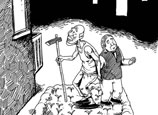
WASHINGTON, Jan. 29 (Xinhua) -- U.S. Federal Reserve pointed to external factors for the sluggish U.S. economic growth, but the American central bank ignored a reality that its own monetary policies have been a drag on the economy, a renowned U.S. economist said Tuesday.
The Fed has boosted purchases of mortgage-backed and U.S. Treasury securities, and now it says more large-scale purchases are coming. They have kept extending the near-zero federal funds rate and now say that rate will remain in place for at least several more years, Stanford University professor John Taylor contended in an article carried on the Wall Street Journal.
"At the very least, the policy creates a great deal of uncertainty. People recognize that the Fed will eventually have to reverse course. When the economy begins to heat up, the Fed will have to sell the assets it has been purchasing to prevent inflation," said Taylor, a former undersecretary of U.S. Treasury Department.
If its asset sales are too slow, the bank reserves used to finance the original asset purchases will pour out of the banks and into the economy. But if the asset sales are too fast or abrupt, they will drive bond prices down and interest rates up too much, causing a recession, he noted.
Since the onset of the financial crisis, the Fed has launched three rounds of quantitative easing programs, known as QE1, QE2 and QE3 and has thus far completed the first two rounds of the quantitative easing programs. With QE1 and QE2, the Fed has bought more than 2 trillion dollars of Treasury securities and mortgage-backed securities, expanding its balance sheet to around 2.9 trillion U.S. dollars and attracting sharp criticism both at home and abroad.
The Fed's current near-zero interest-rate policy also creates incentives for investors including retirees and pension funds to take on questionable investments as they search for higher yields in an attempt to bolster their minuscule interest income. The low rates also make it possible for banks to roll over rather than write off bad loans, locking up unproductive assets, Taylor warned.
















 'Joint effort' urged to clear the air
'Joint effort' urged to clear the air


![]()
